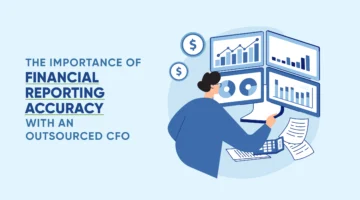Financial Reporting vs Management Reporting, and Why You Need Both
Financial Reporting Vs Management Reporting
Running and managing a business relies heavily upon reporting. Business owners and executive teams cannot confidently make organizational decisions without the foundation of data and reports to rely on. Both financial and management reporting help internal and external stakeholders gain insight into the finances and operations of a business. While most business owners have a general idea of the basic financial reports they should receive each month, many are less familiar with the types of management reports they should utilize to improve overall processes, performance, and profitability. In this article, we’ll break down the difference between the two as well as address the benefits that both can provide to your business.
If your business is in need of more robust reporting, this is an excellent opportunity to seek out CFO agency services.
What is Financial Reporting?
Financial reporting entails exactly what the name implies—creating statements that accurately portray a business’ financial standing. Financial reporting is used to inform external stakeholders, such as lenders or investors, as well as internal stakeholders, such as business owners, to:
- Gain visibility into profitability
- Monitor financial performance and growth
- Compare actual results to the budget
- Ensure compliance with GAAP and regulatory requirements
What Reports are Included?
Financial reports should be generated on a weekly, monthly, and quarterly basis depending on their importance. For example, short-term financial activities can be monitored in a weekly report, whereas your books may only need to be closed monthly, or your budget updated quarterly. Financial reporting typically includes:
- The income statement, also known as the P&L which shows expenses, revenues, profits, and losses during the reporting period.
- The statement of cash flows, which shows the cash inflows and outflows within the reporting period. This is useful when compared to the income statement if the amount of profit or loss doesn’t reflect the cash flows.
- The balance sheet, which shows the assets, liabilities, and equity of the company at a given point in time. If the balance sheet isn’t reconciled, the income statement will be inaccurate.
- The statement of retained earnings, which shows changes in equity within the reporting period.
What is Management Reporting?
While financial reporting is often directed towards external stakeholders, management reporting is used exclusively for internal purposes and is not mandatory. GAAP dictates the standards for financial reporting and compliance; management reporting can be tailored according to the business owner’s needs.
Management reporting focuses on different functions of the business, allowing the business owner to have more visibility and analysis into the finances, operations, and performances of specific departments within the company. Management reports may break down, for example, the profit and loss, utilization, or budget vs. actuals by each department or team. This allows the business owner to see, for instance, how much revenue a department generates over a given period of time, or how well an individual sales representative performs.
Since there is no regulatory body that dictates how management reporting should be done, reports can vary from business to business depending on need. However, common managerial reports include:
- Inventory reports, which show all inventory that a business has at the time of the report, as well as which products sell the best, have the greatest profit margin, or are slower to sell.
- Sales reports, which show a department’s sales activity over a given time, as well as customer acquisition costs, closing times, and conversion rates on lead generation activity.
- Department reports, which show KPIs, projects, and objectives of individual teams within the company.
What are the Benefits of Each Type of Reporting?
Both types of reporting are crucial to effective business management. Financial reporting generally focuses on historical data, since reports are generated within a specific period and show past performance. As such, financial reports can be used to analyze actual results compared to budgets or forecasts, as well as make projections and predictions about the future state of the business. While this is beneficial for internal management, financial reports are required for external stakeholders to be aware of the company’s financial performance.
Different from financial reports, management reports look to the future based on financial and operational data to improve performance. They’re ideal for business owners and executives to gain insight into a specific aspect of the business beyond what a financial report would show. Managerial reports add to the overall visibility and confidence that a business owner can feel when making a decision.
Since financial reporting must adhere to specific requirements, and managerial reporting is open-ended and varies according to business needs, you may be feeling unsure of where to start. If your business is in need of more robust reporting, this is an excellent opportunity to seek out CFO agency services. By outsourcing your reporting, you can save time while gaining additional visibility for your internal team to plan and make decisions.



